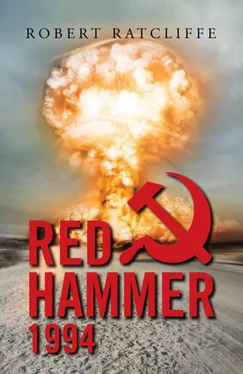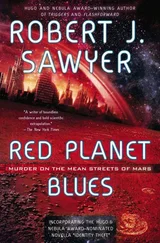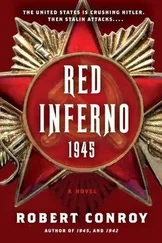Transmitted telemetry to earth indicated a kill, but the screen displaying close-up video from Discovery provided the unquestionable confirmation. First came the blinding laser flash, quickly followed by a bright whitish-yellow explosion as the booster disintegrated. Debris floated off in an irregular circular pattern as the blast gases dissipated. The lack of an audible explosion didn’t detract from the euphoria.
A deafening roar filled the room, but subsided quickly, tempered by the sober realization that the most challenging portion of the test was still to come. Could the laser’s power supply recharge in time? That was the Achilles’s heel.
Booster number two was deep into its trajectory, tracked by super-cooled infrared (IR) and UV sensors. Disengaged by its computer boss, the laser trained toward the rapidly rising hostile target while the prototype power-generating system struggled to regenerate. The second ICBM continued to accelerate toward the drifting shuttles, powered by its third-stage rocket motor. The laser finally locked on, but at a point much farther along the predicted trajectory than the first. There would be no time for a second shot.
The laser beam leapt from Discovery , arcing slightly as it reached toward the slowing spinning earth. This time there was no explosion, and a chorus of groans rose from the rows of consoles. The mission director quickly interceded to interrupt the nominal test sequence. “Break off and go for the third bird,” he ordered. Discovery would translate to the battle manager. The additional twenty seconds for the third booster had proved to be a godsend. Mentally counting the seconds, Thomas noticed that the power supply had not fully recharged after the wasted second shot. He and everyone else gripped their chairs and prayed it would have enough juice.
For the third and final time, the laser burned forth. This time it was a perfect shot. The reduced power level had required the beam to lase for close to three seconds, but it clearly packed enough punch. The propellant in the booster exploded violently, sending off a shower of fragments like holiday fireworks.
The entire room burst into applause, cheering wildly. The instant celebration intensified when the grinning mission director announced that the second ICBM had been knocked off course by a grazing blow and had failed to deploy its dummy reentry vehicles. As good as a hard kill, Thomas surmised. He stood in admiration as everyone slapped backs, a few of the overexcited civilians embracing in a well-earned moment of euphoria.
“Mission Control, this is Discovery , two for three, not bad.”
“ Discovery , this is Mission Control, make that three for three. The second booster was knocked off course and malfunctioned. Good job! Let’s get you guys home.”
Discovery returned to earth, touching down at a backup strip at the White Sands Missile Range in New Mexico. She touched down at dusk, making it difficult to pick out her unique silhouette against the opaque blending of the darkening sky and the rugged spine of mountains to the west.
The mission director passed the word when Discovery was safe.
“General Morgan, Discovery has landed safely,” the mission director shouted, looking up, almost too weak to smile. His ordeal was over. “They reported the airspace was clear, and surveillance sweeps of the area showed no signs of intruders. We pulled it off, sir.”
Morgan, in the gallery, beamed from ear to ear. A gaggle of flag officers waited eagerly to shake his hand. Thomas stayed put on the floor and replayed the day’s momentous events. It was unmistakably the most remarkable demonstration of antiballistic-missile technology he could ever have imagined. Up until now, talk about destroying ballistic missiles in the boost phase had been just that—talk. Now there was a compact, prototype system which clearly showed the potential to significantly alter the strategic balance. Government scientists who witnessed the drama were already talking about how much better a future system could be in only two or three years—four times the power, faster recharge time, a more accurate pointing-and-tracking system, and probably one-half the weight.
The Russians? That one still bothered him. He had his doubts about strategic defenses and their effect on the nuclear equation. He hoped that wisdom wasn’t being pushed aside by euphoria run amuck.
High above the earth, coasting in an abnormal circular orbit of fifteen hundred nautical miles, a small Russian ferret satellite sprang to life, its burst communications transceiver spurting a compressed signal as it traversed Asia. Its passive IR and UV sensors had earlier detected a peculiar phenomenon over the middle of the Pacific Ocean and had dutifully reported the same.

CHAPTER 6
It was a cool, crisp morning in early May. Small, irregular puddles from the previous night’s drizzle steamed and dissolved under a bright blue, cloudless sky; the sun’s precious warmth was building in intensity. Moscow was shaking off the bitterest winter in nearly a decade. Skeleton trees struggled to unfurl their spring coats, while the usual rainbow of annuals lay moribund, bruised by recent temperature fluctuations.
Dr. Sergei Antonovich walked briskly across the old Red Square toward the massive stone edifice of the Kremlin Fortress, clutching a large, sealed brown envelope under his arm. He moved hunched over, deep in thought, his thinning gray hair blowing randomly in the light breeze from the east. He was plump and rumpled and looked every inch the research scientist. Approaching the gate beneath Savior Tower, he fumbled for the wrinkled piece of paper which commanded his presence at an emergency session of the Defense Council. Antonovich led the technical team which had been assigned to investigate strange sightings transmitted to earth by a covert reconnaissance satellite only weeks earlier. His stomach churned, a gas pain forcing him to pause and grimace. Surely there must be a mistake, he thought. Why me? Let the others handle this! Antonovich was a busy man who had better things to occupy his valuable time than stroke politicians.
The lone Kremlin guard, stone-faced and immaculate in his heavy gray overcoat and polished black leather boots, gave the old doctor a cursory glance then waved him through like a cop directing routine traffic. Antonovich’s destination was the presidium, one hundred meters down the worn cobblestone way on the right. He pressed forward gripping the package even tighter. His heart raced. He was deeply troubled by his most recent findings, those too new to receive wide dissemination. Both the Russian Foreign Intelligence Service (SVR) and the military intelligence (GRU) had been criminally remiss in not forecasting this incredible leap in American technology. Those clever Americans were wizards, thought the doctor, shaking his head admiringly. Blame would fall on someone; he was certain of that. Why couldn’t Colonel Kulencho have accompanied him? It was his responsibility to deal with the politics of the intelligence community. The doctor groaned in protest.
Antonovich paused before the impressive presidium entrance, taking a last deep, purging breath. A rush of blood surged to his head, clearing his rambling thoughts. The doctor struggled up the steep granite steps and past the twin guards bracketing the entrance. He cautiously stepped inside, stopping and fishing for his identification card lost in his coat pocket. How he hated the insolent guards at Russian government buildings. Some things never changed.
Locating the worn card amidst numerous notes and wadded receipts, Antonovich flashed it at the sour-looking young man stationed just inside the door. The soldier, no more than a teenager in a freshly pressed uniform, motioned for him to step closer, reaching out and flicking his gloved fingers in the doctor’s face. He rudely snatched the card and held it high in the air, then finally motioned toward the security desk. He had the look of a man about to kick a disobedient dog for messing on the floor.
Читать дальше











